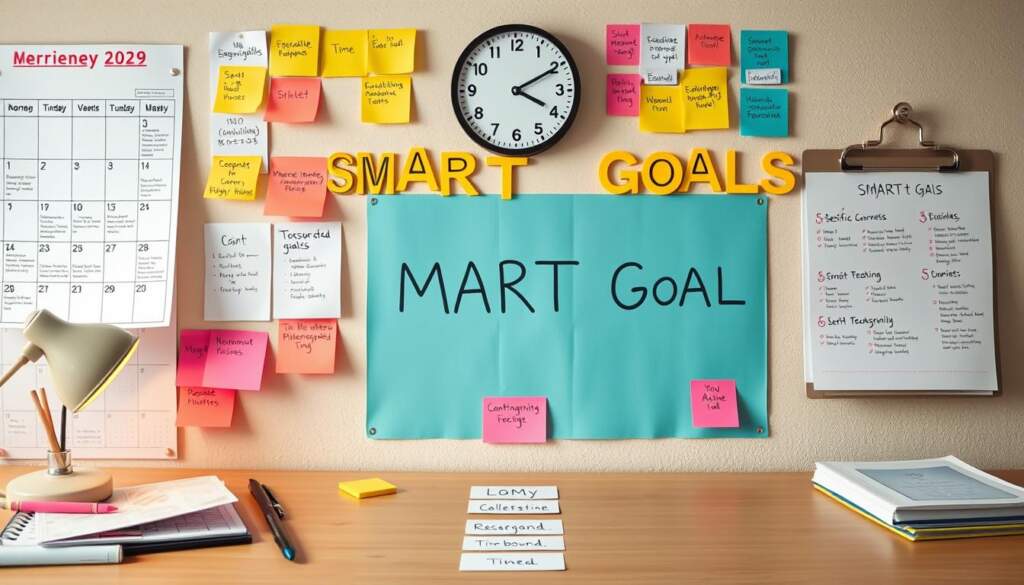Embarking on a workday transformation, it’s vital to acknowledge that productivity extends beyond merely crossing off tasks on a to-do list. It is about the artful balance of time and resources to enhance efficiency and optimize performance in every facet of life. Notably, Penn LPS Online and James Clear’s “Atomic Habits” both underscore the significance of incorporating daily productivity habits, which help in reducing stress, cultivating motivation, and ensuring success across various domains, including academic and professional pursuits. By crafting and adhering to a personalized set of simple habits, one can pave the way for an organized, efficient, and ultimately more productive day.
For example, consider the impact of the Eisenhower Matrix and the Pareto Principle (80/20 rule), which assist in task management and recognizing that a substantial portion of results stems from a fraction of the effort, respectively12. Moreover, the human brain’s limitation to task-switching, rather than multitasking, pinpoints our need for singular focus to elevate productivity2. This, combined with strategic breaks, as advised—lasting 5 to 10 minutes every hour—can prevent burnout and improve concentration, as studies suggest12.
Key Takeaways
- Integrate habit stacking to seamlessly adopt new positive habits into your routine.
- Utilize the Eisenhower Matrix to prioritize tasks efficiently12.
- Implement the Pareto Principle to identify efforts that yield the most significant results1.
- Focus on one task at a time to prevent context switching and its accompanying productivity loss2.
- Regular breaks are crucial for sustained mental acuity and productivity throughout the day12.
- Engage in pre-work rituals and daily inbox management for a stress-free start1.
- Maintain a tidy workspace to foster an environment conducive to focus and efficiency1.
Creating a Morning Ritual for Enhanced Focus
A mindful morning routine not only paves the way for a day filled with increased productivity but also sets a positive attitude that can carry over into every task. Engaging in a well-structured morning ritual is crucial in helping you start the day right and boost your personal productivity.
Hydration as the First Step
Beginning your day with hydration, such as drinking a full glass of water immediately after waking up, rejuvenates your body and kick-starts your metabolism. This simple habit is a cornerstone of a healthy morning routine, promoting wellness and productivity, as well as preparing your body for the day ahead3.
Self-Care Moments Pre-Work
Investing time in self-care before diving into work tasks can tremendously reduce morning stress and enhance your focus. Simple activities like making your bed, indulging in a hot shower, or applying a face mask can transform your morning routine into a sanctuary of peace. This personal time not only helps in maintaining a healthy work-life balance but also ensures you are mentally and physically prepared to tackle your day3.
Embracing these practices not only helps start the day right but also significantly boosts your personal productivity. By setting the tone early, you allow yourself to enter a state of enhanced focus, crucial for tackling the most demanding tasks of the day.
Setting and Attaining SMART Goals in Your Routine
Effective goal setting is essential for productivity and can transform your daily routine into a powerhouse of achievement. Knowing the principles of setting SMART goals is crucial for both academic and professional growth.
Defining SMART Goals
SMART goals—Specific, Measurable, Achievable, Relevant, and Time-bound—are designed to provide clarity and a deadline for achievement. This framework is an integral tool for goal setting, ensuring that objectives are well-defined and within reach, enhancing focus and motivation4. The framework not only advocates for precise ambitions but also insists on measurable benchmarks, which inherently boost accountability and tracking5.
Strategies to Achieve Daily Objectives
When it comes to daily study goals, integrating the principles of SMART goals is invaluable. Setting clear, attainable objectives each day can dramatically increase personal productivity and cultivate consistent work habits6. Below are some strategic measures you can employ:
- Limit daily goals to two or three to maintain focus and prevent burnout5.
- Use the Eisenhower Matrix to prioritize tasks based on urgency and importance.
- Adopt the Pomodoro technique for enhanced time management during study sessions or work commitments.
Additionally, practical tools like ClickUp can assist in organizing and achieving daily goals effectively by providing structured templates and resources5.
Moreover, tracking progress through specific metrics not only anchors your commitment but also provides tangible evidence of your accomplishments. This method has been shown to foster a greater sense of well-being and boost confidence as milestones are achieved6.


Remember, the objective is to make regular, incremental progress. Managing energy levels and focusing on the most crucial tasks early in the day are recommended strategies for maintaining peak productivity6.
| Goal Type | Strategy | Expected Outcome |
|---|---|---|
| Daily Academic Goals | Utilize the SMART framework | Structured progression in learning |
| Professional Milestones | Implementing Priority-Based Techniques | Enhanced focus and achievement rates |
| Personal Development | Adopt Time Management Tools | Improved well-being and reduced anxiety |
By emphasizing strategies that merge the disciplined approach of SMART goals with flexibility suited to individual rhythms, you can achieve not only enhanced productivity but also a sustainable and adaptable workflow6.
Prioritizing Sleep to Improve Productivity
Emphasizing the importance of sleep is key to maintaining both productivity and health. In our fast-paced world, neglecting sleep hygiene can decrease our efficiency and adversely affect our wellbeing.
Establishing a Consistent Sleep Schedule
To harness the benefits of quality rest, establishing a consistent bedtime routine is crucial. Studies show that individuals who sleep less than the recommended seven to nine hours often experience a decline in cognitive function and an increase in stress levels7. For example, research by Harvard Medical School found improved reasoning abilities in those who managed eight hours of sleep compared to those with only six hours or less8.
Adequate sleep also plays an essential role in physical health. According to research from the University of Chicago, sufficient sleep boosts immune system efficiency, significantly increasing flu-fighting antibodies compared to shortened sleep durations8.
Optimizing the Sleep Environment
Creating a bedroom that encourages quality rest is another pillar of effective sleep hygiene. This includes reducing blue light exposure before bedtime and ensuring the room is dark, quiet, and cool. Investments in a comfortable mattress and pillow should not be underestimated, as they are critical to facilitating deep sleep. Studies indicate that reduced sleep can lead to increased risks of obesity, heart disease, and cognitive decline7.
Sports science supports the need for adequate rest as well; for instance, Stanford University found that extended sleep led to significant improvements in athletic performance, such as shooting accuracy among basketball players8.
Understanding the correlation (as shown in numerous studies) between sleep and performance can motivate changes essential for enhancing productivity and overall health. It’s evident that maintaining structured sleep hygiene and a soothing bedtime routine not only optimizes daily functioning but also fortifies long-term health and success.


Nutrition and Exercise: Pillars of Daily Energy
Ensuring that your daily habits support optimal health and energy levels is crucial, especially in a fast-paced world. Two fundamental pillars of maintaining high energy and productivity throughout the day are healthy eating and physical activity. These elements not only contribute to physical well-being but are also essential for robust brain function.
Healthy eating habits are vital for fueling both the brain and body efficiently. Integrating foods rich in vitamins, minerals, and antioxidants is known to boost cognitive function and support overall mental health. Planning meal choices with attention to calorie count and portion sizes helps prevent overeating, ensuring a balanced intake essential for sustained energy9. Including lean proteins in your diet, which require more calories to digest and keep you feeling full longer, can be an intelligent strategy for maintaining energy throughout the day9.
When it comes to physical activity, it goes beyond mere exercise; it encompasses all movements that hustle your body, from walking to more structured workouts. Research indicates that more than two-thirds of health sciences students report low activity levels, yet those meeting the minimum WHO recommendations for physical activity show better productivity and health outcomes10. Regular exercise, even for just 30 minutes a day, is recommended to enhance not only physical health but also mental alertness and academic performance10.
Brain function significantly benefits from both a nutrient-rich diet and regular exercise. The blood flow increases to the brain during physical activities, which helps in sharper thinking and better problem-solving abilities. Moreover, the discipline of maintaining a routine involving both exercise and dietary mindfulness directly correlates with enhanced cognitive capacities and stress management.
| Benefits | Healthy Eating | Physical Activity |
|---|---|---|
| Overall Health | Boosts immune system, reduces obesity rates10 | Increases stamina and enhances cardiovascular health10 |
| Brain Function | Enhances cognitive functions, supports mental health10 | Improves problem-solving, increases alertness10 |
| Emotional Well-being | Stabilizes mood, controls stress levels9 | Reduces symptoms of depression and anxiety10 |
In conclusion, the synergistic effect of healthy eating and physical activity cannot be overstated. These habits are instrumental in maintaining not only physical health but also enhancing brain function and emotional stability.
Effective Stress-Relief Techniques for Better Focus
In our fast-paced world, effective stress-management tools are essential to maintain not just mental health but also productivity at work and in personal life. Exploring coping mechanisms through both proven studies and recommended practices helps us build a resilient approach towards daily stressors.
A recent study reveals that engaging in regular physical activity, such as aerobic exercise, can significantly diminish the overall perceived stress, particularly stress stemming from uncertainty (2022 review)11. Similarly, mindfulness practices such as meditation have been shown to fortify individuals against stress when encountering challenging situations (2022 review)12.
Diet also plays a critical role in how we handle stress. Consuming foods high in added sugars and ultra-processed ingredients has been linked to elevated levels of perceived stress11. In contrast, incorporating mood-regulating foods like eggs, avocados, and walnuts into your diet can enhance your overall ability to manage stress effectively12.
Another helpful approach is connecting with one’s social network which includes friends, family, and even pets. These interactions can lower stress and increase feelings of support11. Engaging in leisure activities or hobbies is also highly recommended, as these can also reduce stress and improve mental well-being12.
| Technique | Description | Impact on Stress Level |
|---|---|---|
| Aerobic Exercise | Regular physical activity like running or swimming | Reduces overall perceived stress and stress due to uncertainty11 |
| Mindfulness Meditation | Practices that focus on being present and aware | Decreases stress response in challenging situations12 |
| Balanced Diet | Eating low in processed foods and high in natural nutrients | Helps to combat high stress levels1112 |
| Social Interaction | Spending time with loved ones, including pets | Boosts oxytocin and decreases cortisol levels11 |
| Hobbies | Engaging in activities like painting, gardening, or music | Relieves stress, enhances life satisfaction12 |
Implementing these productivity techniques not only aids in effective stress management but also fosters an environment where one can thrive academically and professionally. Regularly incorporating these coping mechanisms into daily routines creates a robust defense against the inevitable pressures of life.
Integrating Breaks for Heightened Efficiency
Understanding the significance of workday breaks in the professional environment is key to maintaining not only mental and physical health but also to seeing marked improvements in efficiency and overall job performance1314. Utilizing short, structured breaks can profoundly enhance productivity by refreshing the mind, allowing for clearer thinking and better problem-solving capabilities13.
Reward systems play an integral role in structuring effective workday breaks. By setting personal milestones, and rewarding oneself upon achieving these with small breaks, professionals can see a sustainable boost in day-to-day productivity and motivation14. This could be as simple as a five-minute walk, some light stretching, or a coffee break after completing certain tasks14.
Employing techniques like the Pomodoro Technique—working for focused intervals followed by short breaks—has shown substantial benefits. Studies suggest taking a 17-minute break after 52 minutes of work leads to an optimization of performance among the top professionals15. This method helps in maintaining concentration over longer periods and mitigates the fatigue that comes with prolonged focus15.
Including activities such as deep breathing exercises, mindfulness practices, or even engaging in creative outlets like doodling or puzzle-solving during breaks can significantly influence mental agility and creativity13. Such activities not only relax the mind but also prepare it for upcoming challenges by enhancing cognitive function and promoting an innovative mindset13.
To implement workday breaks effectively, technology tools like timers or apps can be used to remind oneself to step away from continuous work, ensuring those necessary breaks are not skipped14. Listening to one’s body and recognizing signs of fatigue or stress is crucial in taking timely breaks, which ultimately aids in maintaining sustained productivity14.
Indeed, customizing break activities to fit one’s personal preferences and job nature not only makes breaks enjoyable but also optimally beneficial. Whether it’s a quick snack high in protein to boost brain function or a few minutes of meditation, choosing the right kind of break can significantly boost one’s energy and workplace output15.
Ultimately, incorporating structured and strategic workday breaks is not just about stepping away from the work desk; it’s about recharging effectively to foster increased productivity, innovation, and better mental health. This integration of breaks, coupled with an effective reward system, serves as a catalyst for achieving peak professional performance14.
Conclusion
Embarking on the path toward heightened productivity fundamentally entails adopting a suite of habits woven seamlessly into your daily routine, thus enacting lasting changes in work efficiency and overall quality of life. The crux of productivity enhancement strategies often hinges on the precision of habit development, with methods such as the Pomodoro Technique bolstering our focus through structured intervals of work and rest16. Similarly, allowing room for regular reflection aids in understanding our day’s accomplishments, setting the stage for continuous improvement16. Moreover, the stability provided by morning routines, including nourishment from a balanced breakfast or a period of mindful meditation, not only primes the mind for the exertions of the day but also equates to a tangible uptick in cognitive function17.
Intertwined with the SMART criteria for goal setting, these practices reinforce accountability and the ability to measure the strides taken towards our objectives16. On a broader scale, the emphasis on work-life balance through the deliberate insertion of downtime, hobbies, and screen-free periods after work, is not just a nicety but a necessity to recharge and sustain long-term productivity17. It’s through these calculated pauses that we harness our capabilities to return to our responsibilities with reinvigorated vigor and sharpness.
A synthesis of these productivity enhancement strategies within the framework of habit development generates an upward spiral in managing time, reducing stress, and carving out valuable personal time. As we maneuver through our days, remember, the journey to manifesting an optimally productive lifestyle is a personal voyage, rife with individual nuances and adjustments. It is by layering these scientifically backed strategies and insights1617 that we foster an environment conducive to flourishing, setting the foundation for a thriving and gratifying life.
FAQ
How can I enhance my efficiency with daily habits?
What are some key elements of a morning routine that can boost personal productivity?
What does SMART stand for, and how can I apply it to my daily goals?
Can improving my sleep schedule really impact my day-time productivity?
How does nutrition affect my productivity throughout the workday?
What are some effective stress-relief techniques that can help me maintain focus?
Why are breaks important during the workday and how can they increase productivity?
Source Links
- 23 Simple Habits That Will Boost Your Productivity at Work – https://www.greengeeks.com/blog/habits-boost-productivity/
- 10 ways to boost your productivity at work – https://www.atlassian.com/blog/productivity/simple-ways-to-be-productive-at-work
- Best Morning Routine: 21 Steps for a Productive Day [2024] • Asana – https://asana.com/resources/best-morning-routine
- 5 Daily Habits to Boost Your Productivity and Success – https://www.linkedin.com/pulse/5-daily-habits-boost-your-productivity-success-stephen-j-morris-bemnc
- How to Set Daily Goals for Personal Productivity – https://clickup.com/blog/how-to-set-daily-goals/
- 5 Practical Tips to Set Effective Daily Goals – https://rize.io/blog/daily-goals
- The Link Between Sleep and Job Performance – https://www.sleepfoundation.org/sleep-hygiene/good-sleep-and-job-performance
- Sleep Your Way to Success: How Prioritizing Sleep Can Help Boost Productivity and Health – https://gabrielmasantos.medium.com/sleep-your-way-to-success-how-prioritizing-sleep-can-help-boost-productivity-and-health-200a658a096
- Nutrition for Wellness & Productivity – https://www.linkedin.com/pulse/nutrition-wellness-productivity-gabriella-driver
- Diet, Sleep and Exercise: The Keystones of Healthy Lifestyle for Medical Students – https://pmc.ncbi.nlm.nih.gov/articles/PMC9794932/
- 16 Simple Ways to Relieve Stress and Anxiety – https://www.healthline.com/nutrition/16-ways-relieve-stress-anxiety
- 18 Highly Effective Stress Relievers – https://www.verywellmind.com/tips-to-reduce-stress-3145195
- 10 Mini-Break Ideas To Improve Your Productivity At Work – https://www.truworthwellness.com/blog/10-mini-break-ideas-to-improve-your-productivity-at-work/
- Taking Breaks – Learning Center – https://learningcenter.unc.edu/tips-and-tools/taking-breaks/
- 7 Science-Backed Ways to Take Better Breaks – https://zapier.com/blog/better-breaks/
- 10 Habits to Boost Your Daily Productivity – https://naeemabdullah799.medium.com/10-habits-to-boost-your-daily-productivity-93082bd2b7e7
- Daily Routines and Habits of Productive People – https://hubstaff.com/blog/daily-routines-and-habits-for-productivity/





